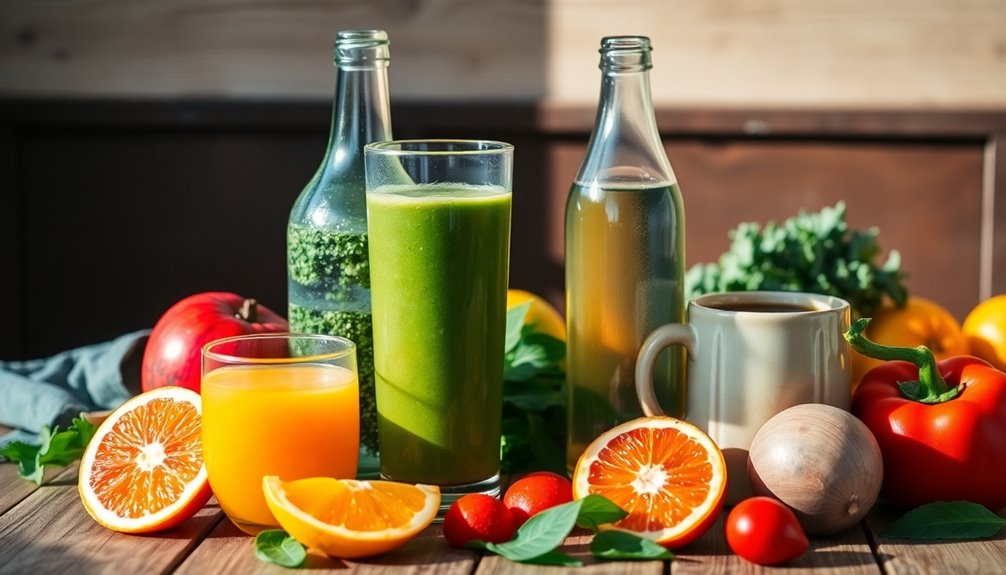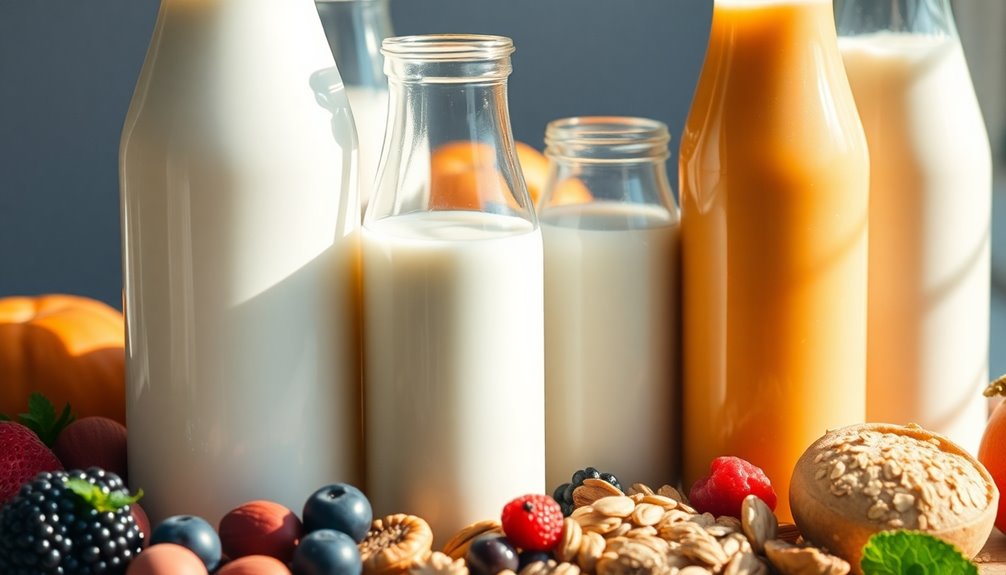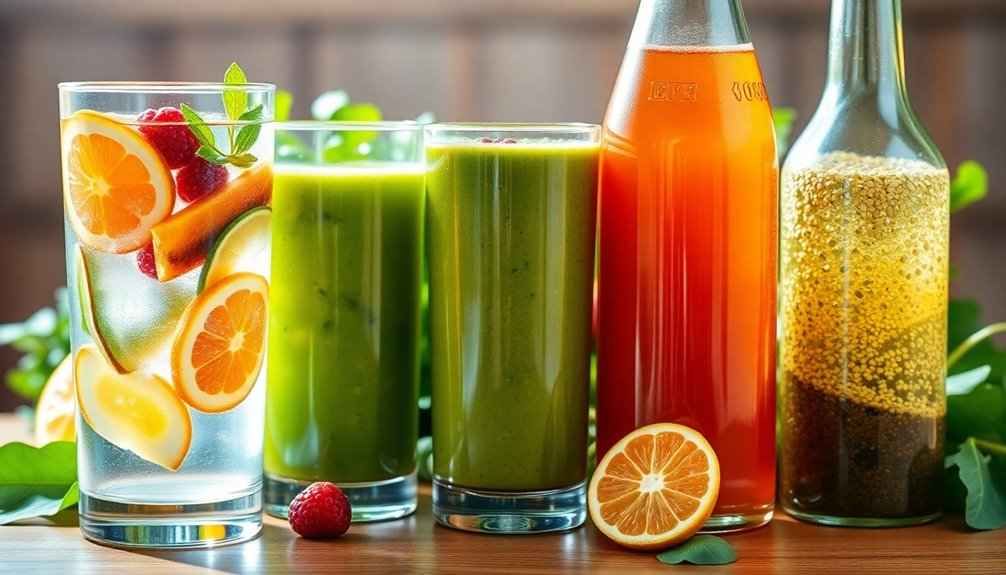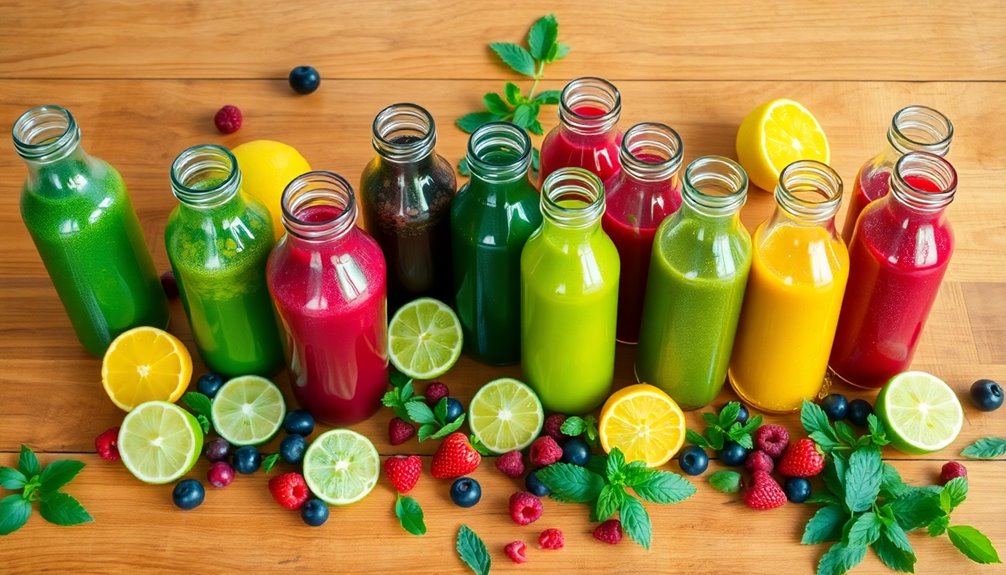Your beverage choices play a crucial role in your health. Sugary drinks are the biggest source of added sugars in the U.S., raising the risk of chronic diseases like diabetes and heart disease. Opt for nutrient-dense options like fat-free milk, 100% fruit juices, or unsweetened plant-based milks. Staying hydrated with water can improve overall health too. Want to discover more about making smart beverage choices? There's a lot more you can learn about your drink options!
Key Takeaways
- Nutrient-dense beverages like milk and 100% juice provide essential vitamins and minerals necessary for healthy growth and development, especially in children.
- Sugary drinks significantly increase the risk of chronic diseases, including obesity, type 2 diabetes, and heart disease due to their high added sugar content.
- Choosing low-calorie, nutrient-rich beverages such as unsweetened plant-based milks and coffee can support cardiovascular health and overall well-being.
- Staying hydrated with water is crucial for various bodily functions, including cognitive performance, digestion, and temperature regulation.
- Community initiatives, like providing filtered water and clear labeling, can promote healthier beverage choices and raise awareness about their nutritional impact.
The Role of Beverages in Nutrient Intake

When you consider your daily nutrient intake, beverages play a crucial role in meeting your dietary needs. Milk, for instance, is packed with calcium, vitamin D, potassium, and magnesium, essential for strong bones and overall health. Including 100% juice can boost your vitamin C and folate levels, especially for older children. Notably, milk consumption was positively associated with intakes of vitamin A, folate, calcium, and magnesium in children. Additionally, incorporating healthy fats into your diet can further enhance nutrient absorption from beverages. While water is vital for hydration, it doesn't provide calories or nutrients but is still your best choice for staying hydrated. On the flip side, carbonated sodas can lower your intake of key nutrients like calcium and magnesium, while fruit-flavored drinks often lack the comprehensive nutritional benefits found in juice. Choosing nutrient-dense beverages can significantly enhance your overall diet quality and nutrient adequacy.
Understanding Sugary Drinks and Their Health Risks

Have you ever considered how sugary drinks impact your health? These beverages, like soda and sweetened teas, are loaded with added sugars and pose significant health risks.
Consuming just one 20 oz. soda can exceed the daily recommended sugar intake for kids, leading to obesity, type 2 diabetes, and heart disease. In fact, drinking two or more sugary drinks daily boosts your risk of dying from heart disease by 31%. Regular consumption (1-2 cans daily) increases type 2 diabetes risk by 26%, making the impact particularly severe for children and women, who face higher risks of obesity and cardiovascular issues.
With sugary drinks being the largest source of added sugars in the U.S. diet, understanding their dangers is crucial for making healthier choices.
Nutrient-Dense Beverages: What to Choose

After recognizing the health risks associated with sugary drinks, it's important to explore healthier options that can enhance your diet.
Consider incorporating fat-free or low-fat milk, which packs 13 essential nutrients, including calcium and vitamin D. You can also choose 100% vegetable and fruit juices without added sugars to help meet your daily recommendations.
Prebiotic beverages like OLIPOP offer fiber while reducing sugar intake. If you're looking for dairy alternatives, unsweetened fortified plant-based milks provide similar nutrients. Low-fat and skim milk is preferred due to its lower saturated fat content.
For hydration, coconut water is rich in electrolytes, ideal after workouts. Finally, don't forget about smoothies or kombucha, which can also deliver valuable nutrients and probiotics to support your overall health.
Choose wisely, and your body will thank you!
The Impact of Beverage Choices on Chronic Diseases

The choices you make about beverages can significantly influence your risk of developing chronic diseases. Regularly consuming sugary drinks raises your chances of type 2 diabetes, heart disease, and obesity. These beverages contribute to weight gain and increase your risk of gout and dental issues.
On the other hand, artificially sweetened drinks might seem like a healthier option, but they can still pose health risks when consumed excessively. Instead, opt for low-calorie, nutrient-dense beverages like coffee, tea, or low-fat milk, which may lower mortality risk and support cardiovascular health. Research has shown that higher intake of sugar-sweetened beverages is linked to increased all-cause mortality and cardiovascular disease incidence.
Hydration: The Importance of Water

While many people underestimate its significance, staying properly hydrated is vital for your overall health and well-being. Water makes up a majority of your body weight and supports essential functions like brain performance, joint lubrication, and temperature regulation. Adequate hydration is important for tissue health and protects against injury during movement.
Dehydration can cloud your thinking, alter your mood, and even lead to overheating.
To maintain proper hydration, remember that most of your water intake should come from beverages, with only about 20% from food. Adjust your intake based on your age, sex, and activity level.
Drinking water not only aids digestion but also helps manage weight and supports heart health.
Dairy and Fortified Alternatives for Essential Nutrients

When considering your nutritional needs, incorporating dairy and fortified alternatives can play a crucial role in providing essential nutrients.
Dairy products, such as cow's milk, are rich in protein, calcium, and vitamin D, supporting bone health and muscle growth. A single cup of milk offers about 30% of your daily calcium and 45% of your vitamin D needs. Plant-based beverages can vary significantly in their nutritional content, so it's important to choose wisely.
If you prefer plant-based options, fortified soy beverages pack around 7 grams of protein and provide essential nutrients like calcium and vitamin D, although typically less than dairy. These alternatives are also lower in natural sugars, making them a healthier choice for many.
Balancing your intake of dairy and fortified options ensures you meet your nutrient requirements for overall well-being.
The Benefits of Tea and Coffee in Your Diet

Incorporating tea and coffee into your diet can significantly enhance your overall health and well-being.
Tea, especially black and green varieties, supports heart health, reduces cancer risks, and boosts metabolism for weight management. Its antioxidants protect against chronic diseases and may even help prevent neurodegenerative disorders. Additionally, studies show that combined consumption of coffee and tea is linked to lower mortality rates. Furthermore, both beverages are rich in antioxidants that combat oxidative stress and promote overall wellness.
On the other hand, coffee sharpens your mental alertness and protects your liver while lowering the risk of type 2 diabetes and certain cancers.
Together, these beverages offer synergistic benefits, promoting cardiovascular health and digestive wellness. Many of them belong to the bestselling beverage brands in the USA, recognized for their commitment to quality ingredients and health-focused formulations. As consumers increasingly prioritize their well-being, these brands continue to innovate, providing options that not only taste great but also support a healthier lifestyle.
By enjoying them in moderation, you can reap their extensive benefits and contribute to a longer, healthier life.
Strategies to Limit Sugary Beverage Consumption

Maintaining a balanced diet isn't just about adding beneficial beverages like tea and coffee; it's also vital to limit sugary drinks that can undermine your health.
Start by choosing options with few or no calories, like water. Gradually reduce your sugar intake by switching to unsweetened drinks, and try adding fruits or herbs to your water for flavor. Research indicates that sugary beverages amplify genetic risk of obesity, reinforcing the need for mindful consumption. Additionally, low carb diets can help curb cravings for sugary drinks by stabilizing blood sugar levels.
Always read nutrition labels to spot added sugars and limit sugary drink purchases at home. Schools and workplaces can also help by offering filtered water and removing sugary options from vending machines.
Finally, support community efforts to promote healthier choices, like implementing soda taxes or clear labeling, so you and your loved ones make better decisions for your health.
Dietary Guidelines for Healthier Beverage Choices

To make healthier beverage choices, you should prioritize drinks that provide nutritional benefits while minimizing those that contribute empty calories.
Start with water, the healthiest option, as it hydrates without any calories. Additionally, remember that hydrating muscles and brain is crucial for optimal performance, so ensure you drink enough throughout the day. Juices can be high in antioxidants, which aid in metabolism and fat burning, but be mindful of portion sizes. Next, consider unsweetened tea or coffee for their antioxidants and low-calorie content. For those looking to diversify their beverage choices, exploring the cranberry juice health benefits for men can be particularly advantageous, as it has been linked to improved urinary tract health and may support heart function. Furthermore, incorporating beverages like sparkling water can add a refreshing twist to hydration without the extra calories found in sugary sodas. Ultimately, the key is to choose drinks that not only quench your thirst but also contribute positively to your overall health and well-being.
Low-fat milk and soy beverages are great for boosting your calcium and vitamin D intake. While fruit juice can offer some nutrients, remember to limit it to no more than 4 ounces a day due to its high sugar content.
Avoid sugary drinks and limit low-calorie sweetened beverages, as they may have unexpected health impacts. Following these guidelines will help you make informed choices and support your overall health.
Promoting Health Through Smart Beverage Decisions

While making beverage choices might seem trivial, your decisions can significantly impact your health. Opting for water as your primary drink is crucial; it hydrates without added calories, enhancing digestion, energy, and cognitive function. Additionally, choosing water can help reduce the risk of negative health impacts associated with sugar-sweetened beverages. Drinking raw food can also promote hydration and provide essential nutrients if incorporated into your diet.
By reducing sugary drinks, you lower your risk of obesity and diabetes. Plus, tap water is cost-effective and environmentally friendly—using reusable bottles cuts down on plastic waste.
When considering your options, check labels for hidden sugars. Try adding fruits or herbs to your water for flavor without the extra calories.
Gradually shifting to healthier alternatives like herbal teas or low-sugar smoothies not only benefits you but also sets a positive example for others. Smart beverage decisions can lead to lasting health improvements.
Frequently Asked Questions
Can I Drink Smoothies Instead of Whole Fruits and Vegetables?
You can definitely drink smoothies instead of whole fruits and vegetables, but keep in mind some differences.
Smoothies may offer convenience and enhanced nutrient absorption, but they can lead to quicker sugar spikes and mightn't keep you as full.
It's best to enjoy both options; whole fruits encourage mindful eating while smoothies can be customized easily.
Moderation is key, so balance your intake to reap the benefits of both forms.
How Do I Read Beverage Labels for Sugar Content?
To read beverage labels for sugar content, start by checking the Nutrition Facts label.
Look for "total sugars" and "added sugars" to differentiate between naturally occurring and added sugars.
Pay attention to the serving size; it's crucial for understanding how much sugar you're consuming.
Use the Percent Daily Value to gauge how a drink fits into your daily limit.
Also, check the ingredient list for terms like high-fructose corn syrup, indicating added sugars.
Are There Health Benefits to Carbonated Water?
Yes, there are health benefits to carbonated water! It hydrates you just as well as still water, helping to keep you refreshed.
You might find it aids weight management by making you feel fuller and can even relieve constipation.
Plus, with no added sugars and fewer calories than sugary drinks, it's a healthier choice.
Just keep in mind that some people might experience bloating or gas from carbonation. Enjoy it in moderation!
What Are the Best Beverages for Weight Loss?
Did you know that certain beverages can actually support your weight loss journey? To help you shed those extra pounds, focus on calorie-free options like water, green tea, and lemon water.
These drinks can boost metabolism and keep you hydrated. Avoid sugary sodas and high-calorie juices, as they can sabotage your efforts.
Instead, opt for herbal teas or kombucha, which not only taste great but also aid digestion and promote a healthy metabolism.
How Can I Make Flavored Water at Home?
To make flavored water at home, start by choosing your favorite fruits, herbs, or vegetables.
Slice them up and add them to a pitcher of water. You can infuse the mixture in the refrigerator for a few hours or overnight to enhance the flavors.
If you prefer a stronger taste, try muddling the ingredients first.
Feel free to mix and match to discover new combinations that suit your taste!
Enjoy refreshing hydration!
Conclusion
As you navigate your beverage choices each day, remember that what you drink can shape your health in ways you might not expect. Will you opt for a sugary soda or reach for a nutrient-rich smoothie? Each sip holds the power to either nourish or harm your body. So, make those smart decisions—because the next drink you choose could be the turning point in your health journey. What will you pour into your glass today?
Cindy thoroughly researches juicing trends, techniques, and recipes to provide readers with practical advice and inspiration. Her writing style is accessible, engaging, and designed to make complex concepts easy to understand. Cindy’s dedication to promoting the advantages of juicing shines through her work, empowering readers to make positive changes in their lives through the simple act of juicing.











